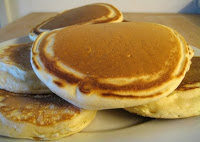



In our recent recipe search, some of our dearest readers have come through with some recipe suggestions.
To refresh your memory…Pam Moroukian was looking for a type of pancake, souvazogh. In answer to this, 2 readers indicated that it sounded like “dzevadzegh”, an omelet or French toast-type recipe.
Here’s what Shushan has sent in. Pam, let us know if this hits home.
Shushan wrote:
“Here’s the recipe for Dzevadzegh (French Toast) from the ‘Tasty Armenian Dishes’ cookbook:
2 eggs, beaten
1/3 to 1/2 cup milk
Pinch of salt, optional
Sugar and cinnamon, maple syrup or favorite jam
4-6 slices day old white bread
1 tbsp butter or margarine
Combine eggs, milk and salt. Heat frying ban and grease lightly. Soak bread slices on both sides in egg mixture. Melt 1/2 tbsp butter for each slice of bread, fry soaked bread on both sides until golden brown. Sprinkle sugar and cinnamon, or spread with jam or maple syrup. Serves 2-3.
Hope this helps!”
**********************************************************
OPTION #2:
Here’s a recipe option I found in Sonia Uvezian’s cookbook, “The Cuisine of Armenia”. It’s called, ‘Armenian Pancakes’, or Dabagaplit.
1 egg, beaten
1 ½ Tbsp melted butter, cooled to lukewarm
½ cup water
2 cups sifted all-purpose flour (approximately)
½ tsp salt
1 ½ tsp baking powder
clarified butter**
sugar
1. In a mixing bowl combine the egg, melted butter, and water; blend well.
2. Gradually stir in the flour salt and baking powder until a soft, smooth dough is formed.
3. With the hands lightly floured, shape into 1 1/4 inch balls.
4. Using a rolling pin on a floured surface, roll each ball into a circle about 5 inches in diameter.
5. In a small, heavy skillet, melt a little clarified butter. Add the circles of dough and fry one at a time until golden brown on each side. Keep the cakes warm while the others are cooking.
6. Add more butter to the pan as needed.
7. Sprinkle with sugar and serve hot.
** Clarified Butter: Melt 1 pound butter in a heavy saucepan over low heat. Don’t let butter turn brown. Remove any foam which rises to the surface. Remove from heat. After a few minutes remove any foam that remains on the surface. Transfer the clear butter to a storage container. Discard any residue from the bottom of the saucepan.
Cover the clarified butter and refrigerate. Use for frying or baking.
OK, Pam, it’s up to you to let us know which one is closer to what you’re looking for.
If anyone has another recipe option, we’re open to suggestions.
Sts. Vartanantz Day is a moveable celebration on the Armenian Church calendar. This year it…
Just in time for soup season, Christine Datian offers The Armenian Kitchen her recipe for…
I don’t know about you, but in our family, we’re all about tradition when…
It’s that time of year again! St. Sarkis Day, the moveable feast day on the…
Way back in 2010 Ara Kassabian shared his family’s recipe for Nevik with The Armenian…
With Thanksgiving Day just hours away, I thought I’d share a few of our favorite,…
This website uses cookies. find out more.
View Comments
In this post-Easter how-do-I-get-rid-of-all-this-food period, may I suggest that, for option 1, you can also use any leftover Easter bread or choereg instead of the bread? That's what I'm planning on doing. Thanks for the recipe! :-)
Sounds like a great way to use up leftover bread anytime!
Doesn't dzevadzegh mean scrambled eggs?
dzevadzegh is scrambled eggs, not french toast.
After a lot of searching, and questioning people "in the know", I found a definition for "dzevadzegh" in the book, "Armenian Food - Fact, Fiction & Folklore", by Irina Petrosian.
And, yes, she defines it as "scrambled eggs".
Case closed.
I always knew Armenian French Toast as "HATZ OV DABAGH"
Yes, Shakuey. That's what we called it in our home, too. Are you, by any chance, Dikranagerdtsi?
Robyn, my great grandmother was Dikranagerdtsi and moved to Halab and married my great grandfather who was Siryani, also originally from Diyarbakir. The irony is I speak Diyabakir Armenian much better than Arabic.
Shakouey, How interesting; thanks for sharing. I miss hearing my father speak this dialect, and am delighted whenever I find someone who does.
Robyn, I only know how to speak this way, I learned from my mother, grandmother, great grandmother and grandmothers sister. My mother can also speak proper Armenian. I have a hard time understanding Armenian unless its a person who speaks Diyarbakir style or people from Halab or Beirut.